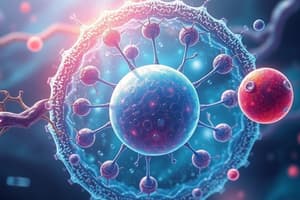Podcast
Questions and Answers
Which process is tightly regulated and energy-dependent?
Which process is tightly regulated and energy-dependent?
- Swelling of cytoplasm
- Necrosis
- Apoptosis (correct)
- Shrinking of cytoplasm
Which process is characterized by the formation of membrane-bound vesicles?
Which process is characterized by the formation of membrane-bound vesicles?
- Blebbing of plasma membrane, maintains integrity
- Swelling & disintegration of organelles
- Necrosis
- Apoptosis (correct)
Which process shows a ladder pattern on agarose gel electrophoresis?
Which process shows a ladder pattern on agarose gel electrophoresis?
- Apoptosis (correct)
- Necrosis
- Non-random degradation of DNA
- Random digestion of DNA
Which process is characterized by the release of cell contents and an inflammatory response?
Which process is characterized by the release of cell contents and an inflammatory response?
Which process occurs at 4°C and is a passive process?
Which process occurs at 4°C and is a passive process?
Which of the following is NOT an example of a physiological adaptive response during cell stress?
Which of the following is NOT an example of a physiological adaptive response during cell stress?
What is the function of heat shock proteins (HSPs) during cell stress?
What is the function of heat shock proteins (HSPs) during cell stress?
What is the difference between hyperplasia and hypertrophy?
What is the difference between hyperplasia and hypertrophy?
Which of the following is a target of apoptosis?
Which of the following is a target of apoptosis?
What triggers necrosis in cells?
What triggers necrosis in cells?
Which of the following is NOT encompassed by the study of pathology?
Which of the following is NOT encompassed by the study of pathology?
What did R. Virchow propose about disease and cellular changes?
What did R. Virchow propose about disease and cellular changes?
Which of the following is a potential cause of cell death?
Which of the following is a potential cause of cell death?
What are some examples of pathological stimuli that can cause cellular stresses?
What are some examples of pathological stimuli that can cause cellular stresses?
What is the role of genetic and immune factors in cellular adaptation to environmental stresses?
What is the role of genetic and immune factors in cellular adaptation to environmental stresses?
Which of the following is NOT included in the study of pathology?
Which of the following is NOT included in the study of pathology?
What did R. Virchow propose about disease?
What did R. Virchow propose about disease?
Which of the following is a pathological process that may result in abnormal cell growth?
Which of the following is a pathological process that may result in abnormal cell growth?
What can stimulate healing in response to pathological stress?
What can stimulate healing in response to pathological stress?
What can cause cellular stresses according to the text?
What can cause cellular stresses according to the text?
Flashcards are hidden until you start studying
Study Notes
Cellular Processes
- Exocytosis is tightly regulated and energy-dependent.
- Endocytosis is characterized by the formation of membrane-bound vesicles.
Genetic Analysis
- DNA fragmentation shows a ladder pattern on agarose gel electrophoresis.
Cellular Stress
- Necrosis is characterized by the release of cell contents and an inflammatory response.
- Facilitated diffusion occurs at 4°C and is a passive process.
Cellular Response to Stress
- Heat shock proteins (HSPs) protect cells against protein denaturation during cell stress.
- Hypertrophy is NOT an example of a physiological adaptive response during cell stress.
- Hyperplasia is an increase in cell number, while hypertrophy is an increase in cell size.
Apoptosis
- Apoptosis targets damaged or unwanted cells for destruction.
Pathology
- Necrosis is triggered by ischemia, which can cause cell death.
- Pathology does NOT encompass the study of normal cellular function.
- R.Virchow proposed that disease arises from cellular changes.
- Cellular stresses can be caused by pathological stimuli, such as radiation or chemicals.
- Genetic and immune factors play a role in cellular adaptation to environmental stresses.
- Cancer is a pathological process that may result in abnormal cell growth.
- Healing can be stimulated in response to pathological stress through various mechanisms, such as protein synthesis.
- Cellular stresses can be caused by factors such as hypoxia, radiation, or chemicals.
Studying That Suits You
Use AI to generate personalized quizzes and flashcards to suit your learning preferences.




